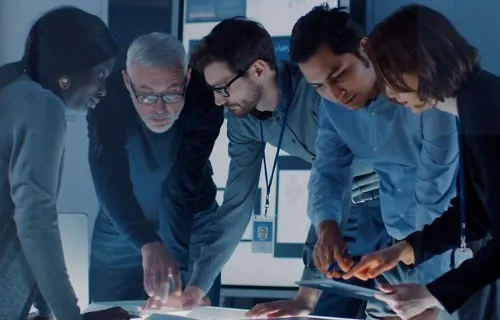Last week I had the pleasure of attending Civil Service Live in London, an excellent event which provided a real insight into the way in which Government is embracing change through digital. As platinum sponsor, the two days also gave my organisation, CGI, the opportunity to showcase our own digital transformation work in Government and healthcare.
During the conference I had the opportunity to meet with both Sir Jeremy Heywood, Head of the Civil Service and John Manzoni, the service’s first Chief Executive. The key topic of discussion was the acceleration of transformation across the service as ‘Digital by Default’ and ‘Government as a Platform’ approaches help to deliver the ambitious and necessary efficiency improvements, cost reduction and service enhancements. At the heart of the agenda are digital programmes that cut across departments, agencies and functions to deliver greater value and transformation of how Government operates.
At CGI we are absolutely committed to working with our public sector clients to unlock such opportunities. We believe that technology, whilst important, is simply an enabler of this type of change. What’s also fundamentally important is re-engineering government processes at the business level, through customer-centricity and a re-examining of how services are delivered.
The work our teams are undertaking with the GDS and individual government departments is focused on just this. At the conference we displayed an example of the new ‘Prosecutor app’ developed for the CPS, which negates the need for prosecuting solicitors to carry bundles of papers – allowing them to interact with case management systems, digitally. It is this type of ‘Digital by Default’ innovation that will support the UK Civil Service in its drive to match the productivity levels of many of our European neighbours.
Indeed innovation was our key focus at the conference, and we had the privilege of hosting an “Innovation Theatre”, showcasing the work being undertaken by government departments, our own teams and many of our SME Accelerate partners.
Collaboration is Key
The second key theme I took away from the conference was undoubtedly the need for greater collaboration. In his interactive session, “How we are building a new partnership between health and social care” Jon Rouse, Director General for Social Care, Local Government and Core Partnerships at the Department of Health, stated that information technology and governance would be a key enabler in integrating health and social care into “a coordinated service that meets [the patient’s] needs”. Towards the end of the presentation the audience was asked if they felt that more departments might benefit from an integrated, collaborative approach. The answer was unanimously, ‘yes’.
Similarly, Jane Taylor, from the Department of Work and Pensions presented a very interesting session, during which she stressed a five-year vision that would focus on making “it easier for different departments to join up”. This, she continued, would require a “set of structures that make us faster and help us to work better together”. Jane pointed to Government Digital Services working collaboratively with private sector partners to practice ‘Government as a Platform’, as a key mechanism for achieving such a vision.
CGI’s own Steve Kershaw discussed the potential of data sharing and multi-agency collaboration in his “Power of Sharing” presentation. Whilst Steve focused on information sharing and the potential of data analytics to identify and protect at-risk citizens, the importance of collaboration between government agencies to make multi-agency collaboration happen was a common thread throughout his session and numerous others.
Final Thoughts
Whilst my Civil Service Live experience could only ever be a brief snapshot of the many ideas shared during the conference, it was abundantly clear that the Civil Service is embracing the benefits of digital transformation. As we seek to facilitate improved services and increased efficiency as a key means of delivering on the government’s austerity requirements for this parliament, the move to digital will be crucial. As agencies and departments seek to work more closely together to share resources, information and provide more joined-up services to citizens, the need for approaches that facilitate collaboration and enable transformation at the underlying business level should be a very firm priority for all those concerned.





